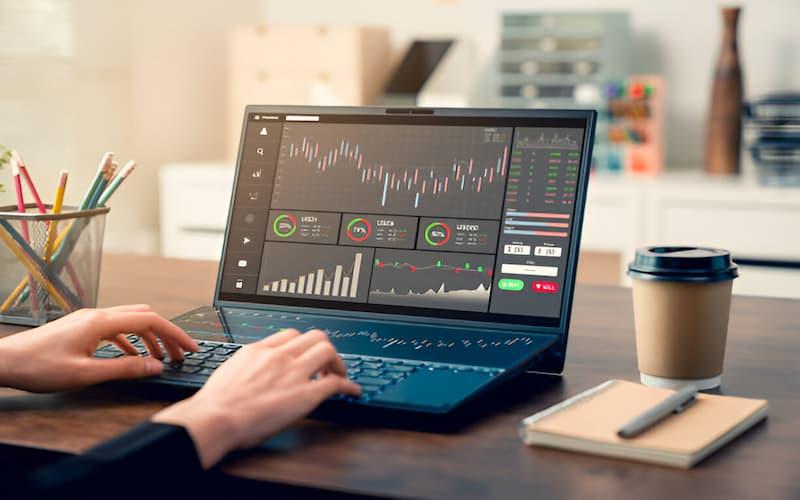Mobile Trading Apps vs Desktop Software: Which Should You Use?

In the modern-day dynamic financial markets, traders need to have speed, flexibility, and precision. Regardless of whether you trade stocks, forex, crypto, or commodities, the tools that you employ are really important to your success. Among the most popular questions that new and experienced traders ask, there is the following one: Which one is better: trade on a mobile app or use desktop trading software?
Although both platforms are strong in their own way, the right platform to use is based on how you prefer to trade, your trading objectives, and your lifestyle. In this blog post we are going to compare mobile trading applications and desktop trading software to see which one is better to suit you.

1. The availability and ease of accessibility.
Mobile Trading Apps:
The greatest strength of mobile trading apps is its portability. Be it on the road, during the commute or even when you are not at your desk, you can track markets, make trades and manage your portfolio with only a few taps on your phone.
The current mobile apps are simple to use and designed to be fast and therefore can be used in making quick decisions and real-time notifications. Mobile apps are essential to active traders who have to be connected 24 hours a day.
Desktop Trading Software:
Desktop software is not as portable, but is more in-depth and functional. It has a more detailed interface, improved charting, and is faster--all of which is significant to high-frequency or professional traders.
Desktop trading software provides the flexibility and power that you require when your trading strategy is complex, you have multiple monitors or when you are using advanced scripting tools.
2. Features and Tools
Mobile Apps:
Majority of mobile trading applications currently have the following important tools:
-
Market data in real time
-
Basic indicators charting
-
Market, limit, stop-loss order execution
-
Watchlists and alertsNews feeds
They are however generally restricted in more sophisticated tools, such as algorithmic trading, custom indicators or scripting.
Desktop Software:
The desktop platforms are more robust and provide:
-
Technical analysis and charting Advanced
-
Custom script and indicators support
-
Multi-monitor support
-
Strategy simulators Backtesting
-
Market data level 2 access
Trading software such as MetaTrader 5, Thinkorswim and NinjaTrader are professional grade and designed to support the requirements of institutional traders.
3. Stability and Speed
Mobile Apps:
Although modern mobile apps are designed to work fast, they still require mobile network stability. A poor internet connection may slow down the execution of orders or introduce data delays--a serious problem to a day trader or scalper.
Desktop Software:
Desktop trading programs are linked through high-speed internet on a stable platform that provides quicker execution, more dependable data feeds and low latency. This is especially critical to traders who trade large volumes or in fast moving markets.
4. Security
Mobile Apps:
Mobile platforms are highly secure, and they include such security features as biometric (fingerprint or face ID) and two-factor authentication (2FA). Nevertheless, the risks that can be potentially dangerous are connected to losing your device or to using unsecured Wi-Fi networks.
Desktop Software:
Desktops usually provide better all-round protection- particularly when accompanied by antivirus software, firewalls, and secure VPNs. The encrypted data transmission and secure login procedures are also present in most trading software.
5. Use Case Scenarios
Consider Using Mobile Apps in Case You:
-
Have to monitor markets or make trades when you are out of your office
-
Are an amateur trader or investor
-
Favor the simple and the convenient
-
Prefer immediate alerts of prices or news events
Apply Desktop Software in Case:
-
Become an active or professional trader
-
Demand higher order analysis software or personal indicators
-
Have more than one monitor or multilayered layouts
-
Rely on high-bandwidth, reliable connectivity to trade high volume products
Which then should you choose?
Most traders find a hybrid arrangement the most effective: they use desktop trading software to plan and execute during market hours, but mobile apps to keep a watch on positions or respond to market news when they are on the road.
The bottom line is how you trade, where you trade and what tools you require. A long-term investor may be quite content with the mobile apps, whereas an algorithmic trader may require the capabilities of a desktop workstation.
Final Thoughts
With the era of digital trading, mobile applications as well as desktop trading software have advanced to suit the needs of the current traders. Knowing their advantages and drawbacks will allow you to create a system that best suits your trading style and your lifestyle.
Trading software is the key to success in the market whether it be tapping opportunities on your phone or running high-frequency trades on your desktop.
- Art
- Causes
- Crafts
- Dance
- Drinks
- Film
- Fitness
- Food
- Games
- Gardening
- Health
- Home
- Literature
- Music
- Networking
- Other
- Party
- Religion
- Shopping
- Sports
- Theater
- Wellness



